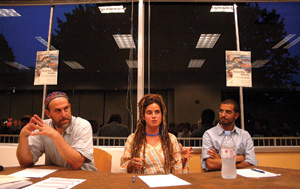 Matt Rubin
Matt RubinOn Monday, Sept. 11, alumni from the Arava Institute for Environmental Studies in Israel visited the South 40 with a message of peace and understanding. Approximately 50 students came to listen and participate in the forum in Northwest Wohl.
The alumni, Mohammed Atwa of Gaza and Rina Kedem of Israel, told the story of their experiences learning and growing on the Institute’s campus on Kibbutz Ketura in the Arava desert in southern Israel. Rabbi Michael Cohen, the director of special projects for the Institute, joined the pair as a representative of the program.
Atwa and Kedem spoke about the unique challenges of living together in such a diverse community for an extended period of time, an experience, which as Rabbi Cohen described, helps students to “transcend [the] differences and borders” of the region through an environmental perspective.
Among the challenges the students faced were the personal biases they entered the program with and the skepticism of their relatives and friends.
Atwa detailed the difficulties of adjusting to life in Israel and living with a Jewish roommate.
As he adjusted to Arava, he was confronted by criticism on all sides. “People said I was crazy, people said I was a spy, and people said I was a traitor. People said all kinds of bad things.”
Despite all this and worse – Atwa was wrongfully arrested as a suspicious person at an environmental protest because of his Palestinian features – he persisted and built upon his previous knowledge of life in the Middle East. Upon leaving the program, he had come to the understanding that “the answer is building peace.”
Kedem expanded upon the idea of creating peace, sharing how Arava had helped her to see how sustainable change would be possible through “change on the grassroots level and on the management level.” She also explained that the Arava Institute allows students to work at both of these levels.
Students were impressed by the pluralistic attitudes of both participants. “That’s what [the forum] is about,” said junior Aviva Joffe, president of Students for a Peaceful Palestinian-Israeli Futre. “Bringing people together in any kind of setting [for dialogue].”
Senior Aisha Sabar, the Muslim Student Association event coordinator, added that the event hoped to, at a more basic level, provide the context for an informed discussion of the Middle East conflict.
The forum was co-sponsored by the International and Area Studies department, the Muslim Students Association (MSA), and Students for a Peaceful Palestinian-Israeli Future (SPPIF).
The program strove to reinforce the values of diversity, communication and understanding that are central not only to MSA and SPPIF, but to the mission of the Arava Institute.
The Arava Institute presents a unique blend of environmental studies and international coexistence. Rabbi Cohen also encouraged Washington University students to actively investigate the possibility of studying at Arava.
Kedem went on to explain the ultimate goal behind studying at Arava.
“If we can prove that there is one issue that we can work together [on],” she said, “then that is a model to work on other issues together; that is the inspiration, that is the tool [that Arava provides].”
For more information on the Arava Institute, visit http://www.arava.org/